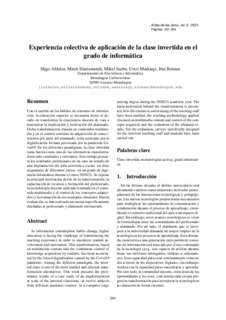| dc.rights.license | Attribution-NonCommercial-ShareAlike 4.0 International | * |
| dc.contributor.author | Aldalur, Iñigo | |
| dc.contributor.author | Illarramendi, Miren | |
| dc.contributor.author | Iturbe, Mikel | |
| dc.contributor.author | Markiegi, Urtzi | |
| dc.contributor.author | Roman Txopitea, Ibai | |
| dc.date.accessioned | 2021-12-30T09:15:13Z | |
| dc.date.available | 2021-12-30T09:15:13Z | |
| dc.date.issued | 2021 | |
| dc.identifier.issn | 2531-0607 | en |
| dc.identifier.other | https://katalogoa.mondragon.edu/janium-bin/janium_login_opac.pl?find&ficha_no=166266 | en |
| dc.identifier.uri | https://hdl.handle.net/20.500.11984/5437 | |
| dc.description.abstract | As information consumption habits change, higher education is facing the challenge of transforming the teaching experience in order to maximize student involvement and motivation. This transformation, based on multimedia content and the continuous control of knowledge acquisition by students, has been accelerated by the forced digitalisation caused by the Covid19
pandemic. Among the different paradigms, the inverted class is one of the most studied and relevant transformation alternatives. This work presents the preliminary results of a case study of an implementation at scale of the inverted classroom -in twelve subjects from different academic courses- in a computer engineering degree during the 2020/21 academic year. The main motivation behind the transformation is presented, how the resources and training of the teaching staff have been enabled, the teaching methodology applied (focused on multimedia content and control of the concepts acquired) and the evaluation of the obtained results. For the evaluation, surveys specifically designed for the involved teaching staff and students have been carried out. | en |
| dc.description.abstract | Con el cambio de los hábitos de consumo de información, la educación superior se encuentra frente al desafío de transformar la experiencia docente de cara a maximizar la implicación y motivación del alumnado. Dicha transformación, basada en contenidos multimedia y en el control continuo de adquisición de conocimientos por parte del alumnado, se ha acelerado por la digitalización forzada provocada por la pandemia Covid19. De los diferentes paradigmas, la clase invertida toma fuerza como una de las alternativas transformadoras más estudiadas y relevantes. Este trabajo presenta los resultados preliminares de un caso de estudio de una implantación del aula invertida a escala -en doce asignaturas de diferentes cursos- en un grado de ingeniería informática durante el curso 2020/21. Se expone la principal motivación detrás de la transformación, la capacitación de recursos y formación del profesorado, la metodología docente aplicada (centrada en el contenido multimedia y el control de los conceptos adquiridos) y la evaluación de los resultados obtenidos. Para la evaluación, se han realizado encuestas específicamente diseñadas al profesorado y alumnado involucrado. | es |
| dc.language.iso | spa | en |
| dc.rights.uri | http://creativecommons.org/licenses/by-nc-sa/4.0/ | * |
| dc.subject | Clase invertida | es |
| dc.subject | Metodologías activas | es |
| dc.subject | grado informática | es |
| dc.title | Experiencia colectiva de aplicación de la clase invertida en el grado de informática | es |
| dcterms.accessRights | http://purl.org/coar/access_right/c_abf2 | en |
| dcterms.source | Actas de las XXVII Jornadas sobre la Enseñanza Universitaria de la Informática | en |
| local.contributor.group | Ingeniería del software y sistemas | es |
| local.description.peerreviewed | true | en |
| local.description.publicationfirstpage | 291 | en |
| local.description.publicationlastpage | 294 | en |
| local.source.details | Vol. 6. Pp. 291-294, 2021 | en |
| oaire.format.mimetype | application/pdf | |
| oaire.file | $DSPACE\assetstore | |
| oaire.resourceType | http://purl.org/coar/resource_type/c_c94f | en |
| oaire.version | http://purl.org/coar/version/c_970fb48d4fbd8a85 | en |








